Are you a fine artist or a fine art appreciator? Maybe you’re just a fine person who enjoys art! Whatever type of artwork floats your boat, you’ve come to the right place.
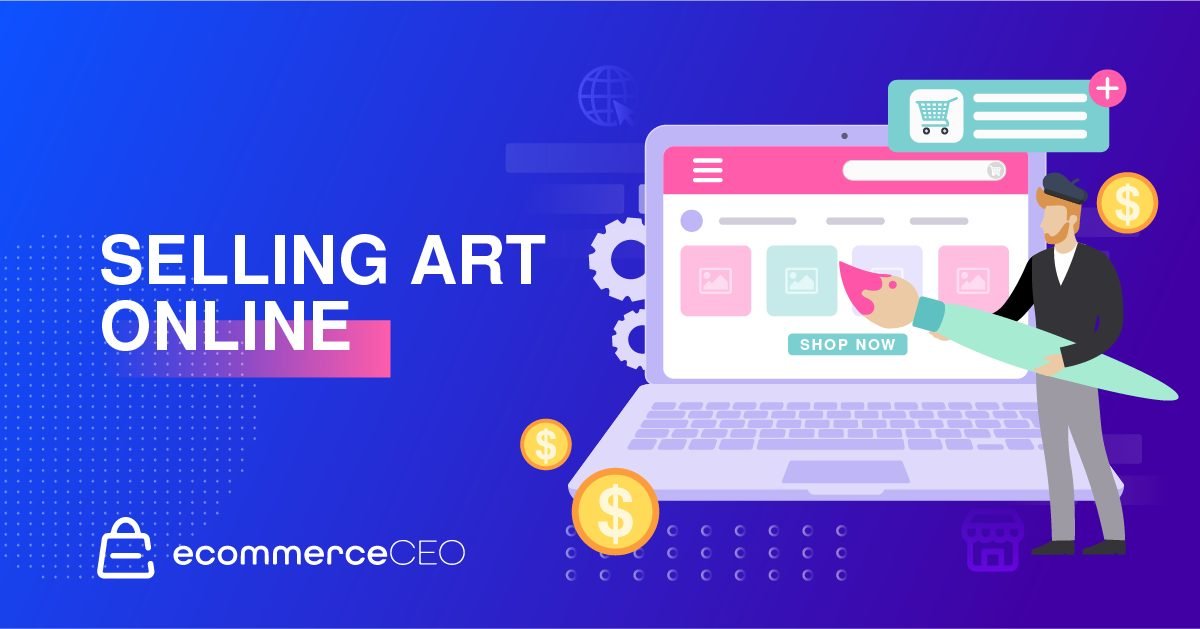
As an artist, whether you’re already established or still breaking out, selling artwork online allows you to connect with a broad global audience. These are art enthusiasts ready and willing to pay for custom prints and other art-related products that you offer.
Why Sell Art Online
According to Gitnux Must-Know Art Industry Statistics, 60% of art dealers predict growth in art fairs and online sales in the next 1-2 years, with online sales rising at 45%.
Selling art prints or fine art online is easier than ever, thanks to the sheer number of digital art marketplaces out there. Overhead-wise, it’s also a lot cheaper.
You substantially reduce your costs when you sell art online instead of a brick-and-mortar store. You won’t have to pay for rent, or related electricity or commodity costs like water, an extra Internet connection, phone lines, gas, heating, cooling, and so on.
Besides lowering costs to market, an online marketplace opens up digital products to a large audience that is already online every day for digital interactions.
You can reach most users (and potential customers) through their usual online habits, such as:
- social media platforms
- email newsletters
- specialized art sites, like Saatchi Art.
Benefits Of Selling Art Online
Before the Internet and ecommerce platforms, artists had to rely on selling their original artwork through physical marketplaces like:
- art galleries
- third-party galleries
- boutiques, shops, and stores
- art agents.
With an online art store, you can:
- access free marketplaces to advertise your custom (or curated) art to potential buyers
- sell directly to art buyers and eliminate many costs of physical shopfronts
- reach more people globally, widening your product market.
Real-life Success Stories Of Independent Artists
Be inspired by successful, original artists who have capitalized on the growing online art marketplace and make money with art online.
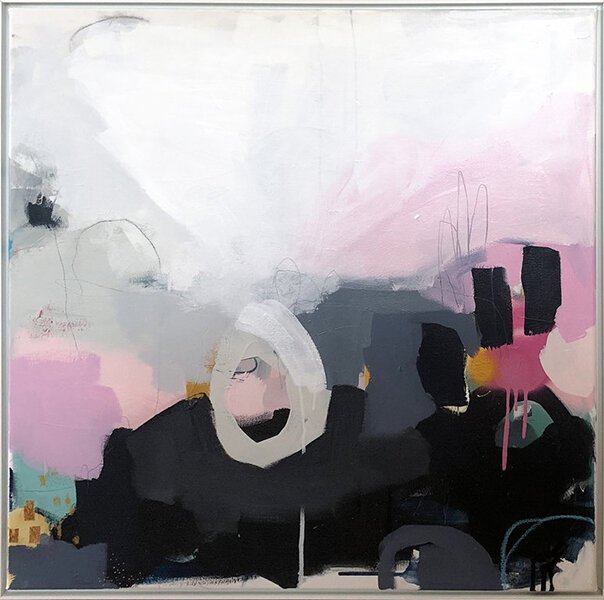
Canadian artist Andrea Soos uses a creative combo of gestural color, patterning, and mark-making to create interesting and playful abstract art. She’s got 104K followers on Instagram and regularly posts photos of her work with relevant hashtags and associated mentions (hint: use this content strategy when posting on Instagram).

Warsaw-based Pawel Nolbert explores rich colors and visual imagery and creates images. On Instagram, he has 274K followers. He’s collaborated with incredible brands like:
- Apple
- Nike
- Sony
- Adidas
- Polaroid
- Microsoft
- Disney
- Mercedes-Benz
- Squarespace.

Award-winning artist Aaron Hazel’s art centers around marginalized figures and stories of the Wild West that might otherwise fly under the radar, emphasizing Native American, African American history, and civil and human rights.
Find him on Instagram as well, with 12K followers.
Check out more legit art power players on Starter Story: 23 Art Business Success Stories & Case Studies.
Creating Your Artwork And Products
You can create your own art or curate other artists’ work. Need some inspiration? Use creator tools to create original art.
If you don’t personally have artistic talent but have a good eye for art, partner with artists to help them market and sell their art online. In partnership with an artist, you make a margin, or commission, of the selling price for assisting with the online art sales. This can be up to a 50% split.
What type of art will you sell? Here are some ideas:
- Original artwork or reproductions (or do both)
- Prints: limited or open edition (framed, unframed, or canvas)
- Repeat prints on wallpaper, fabric, or wrapping paper
- Merchandise: your artwork printed on clothing, hats, mugs, stationery, greeting cards, etc. with print on demand technology
- Custom art: one-of-a-kind pieces you create based on a customer’s request
- Licensing deals with other brands (best for photographers and illustrators)
- Brand collaborations: create a special, limited edition prints collection that’s sold through your print on demand partner brand’s store
- Digital art: create your digital artwork free on Pixilart, SculptGL, artworktool, Sketchpad and more, or make and sell digital prints
- Crypto art: design NFTs and make crypto relevant art that has the ability to transform between an NFT of a physical print
- Curated art: with your art eye, produce good art by creating desirable collections
Determine Your Target Audience
“Before, customers went to brands. Today, brands must go where their customers are. Brands would be wise to start adopting this behavior now.”
Harley Finkelstein, President at Shopify
Who will you be selling your art to? Understanding your target audience means you can reach them through their preferred platforms. Consider demographics like:
- age or generation
- location
- education level
- employment status.
To help with pricing your art, find out what your target audience is:
- online spending behaviors
- disposable income
- discretionary spending funds.
If you’re selling online through social media platforms, you’ll be able to review and refine your targeted audience through available platform analytics.
If you have your own website, you can use Google Analytics to provide further insights into your target audience. Spend some time developing a target buyer persona(s) for those key customers you want to reach.
Choose A Subject Matter Or Theme
What are you passionate or artistically inclined about? Your body of work could be light, humorous, beautiful, thought-provoking, or serious. Make sure it inspires you so it’s easy to keep creating or curating fresh content.
Making A Portfolio
Use a free portfolio website builder like Canva to create a simple online display of your art.
An online portfolio provides an accessible way for potential customers, curators, or galleries to check out your work. You could also showcase fellow artists and photographers, or reproductions of art. Make sure to include high-quality images.
Develop Your Product Line
Consider your artistic goals and where you dream of taking your art brand. Will you stick with fine art, or do prints? If you’re making reproductions, you’ll want to find a printer. If you move into merchandising, who will be your supplier?
Develop profitable pricing for your products. Factor in expenses like:
- art materials
- running your ecommerce platform
- marketplace selling fees
- any marketing costs
- other overheads you pay out of pocket.
Art Market Research has been measuring price movements in the fine art market since 1976. To get an idea of the value of work in painting, sculpture, print, and photography, check out their list of individual and group indexes.
Setting Up Shop
Now that you know what you’re creating or curating and who your target audience is, it’s time to bring it to life!
Register Your Art Business
Before you set up your online shop, it’s important to have your business affairs and accounts to prepare for taxes and potential scale.
Do your research before you choose your best-fit business structure. In the US, you can register as a sole proprietorship or a Limited Liability Company (LLC).
You need to:
- be registered as a business to have an employer identification number (EIN), which is typically required to set up a business bank account
- check if you need a business license to sell your art (refer to your state’s Secretary of State or Business Division).
Consider trademarking your business if you want to protect words, phrases, symbols, logos or designs related to your brand and offering.
Understand your rights and the associated legal action you could take. Plagiarism and copycats are a reality of doing business in this digital age.
Finding The Right Platform
There’s no shortage of platforms for artists to sell art prints online. Online art marketplaces could soon eclipse physical shopfronts. No matter what platform you choose, make sure you consider the user experience. Happy users who can use your site are more likely to be art buyers.
Future-proof your business and sell your art online. Instagram Shop and shoppable posts are a common way to both shop online and sell physical goods. Here are a few more ideas:
- Create a Shopify store and sell art on your own website.
- Build your own store on Facebook, Instagram, and Pinterest.
- Sell your designs on Facebook Marketplace.
- Market to specialized audiences using Facebook Groups for artists and art collectors.
- Use TikTok ads or Instagram Reels to promote your products.
- Try selling on Etsy – one of the most popular platforms with original artists and creators.
Looking for an online art market where you can sell your designs on stationary, canvas, stickers, t-shirts, and more? Some top sites for independent artists and photographers include:
- Fine Art America
- Amazon Handmade
- Society6
- Redbubble
- Artfinder.
Check out our full list of the 24 best places to sell art online.
Establishing Payment Options
When you’re selling online without a physical storefront, you need a safe and secure way for your customers to pay you so that you receive the money. If you’re not selling in person, payment methods become digitized. A payment gateway enables you to get paid. This usually involves some form of technology that encrypts the data from the checkout page where customers enter their card information. There’s also usually some form of transaction fee.
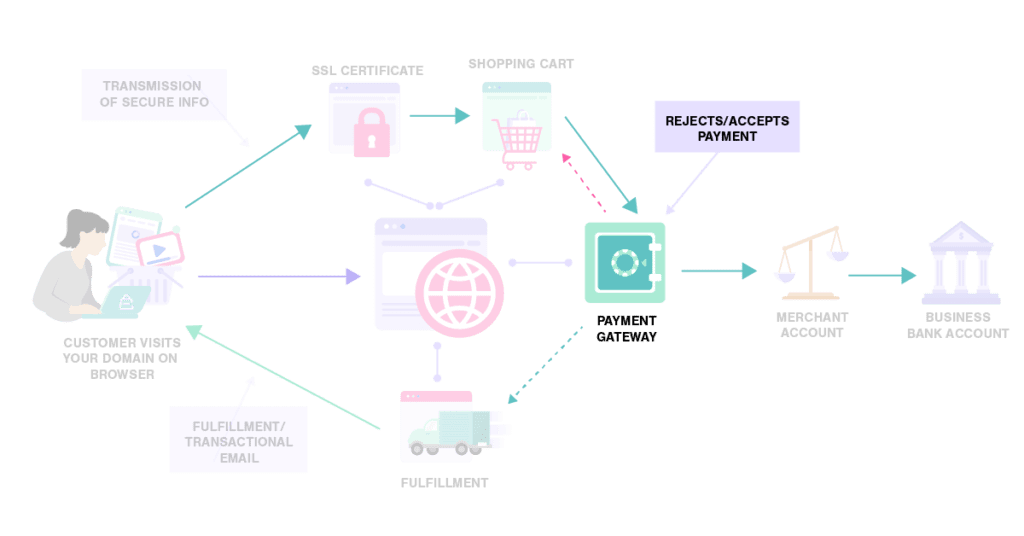
A credit card processor is a third party between your business and your customers’ credit card company. You may also hear it referred to as a payment processor (not to be confused with a payment gateway). You cannot accept credit card payments without one.
Creating An Attractive Storefront
You’re in the business of art, so your shopfront has got to make a big impact and be beautifully artistic.
A storefront is a customer’s first impression of your business and brand. It needs to attract, draw, entice, and welcome the customer. It should provide good storytelling of what you do and what the value of your work is.
Creative Promotions And Incentives
Many emerging artists run promos and giveaways to attract new business. Run these through social media channels, or throw in some free merch for every purchase.
Customers love to be surprised and delighted. Find ways to exceed their expectations, and they will stay interested in your brand. You can also employ a loyalty program to retain customers and increase repeat sales.
Understanding Taxes And Fees
Be prepared for tax time by understanding the requirements of your business structure and any related taxes and fees.
If you use a professional tax preparer or accountant, chat with them about your situation. If not, head straight over to the IRS website for detailed information.
We’ve written an article on blogger taxes that may also be relevant to those working in the art industry.
Additional Places Where You Can Sell Art Online
Sell your art:
- on online platforms like online galleries
- to graphic designers (or related companies) to make products
- as prints and merchandise.
Check out our list of the 24 best places to sell art online.
Managing Your Inventory
Keeping track of your stock and ensuring you have the right products available is crucial for ecommerce. Inventory management software helps you streamline your business operations, tracking your stock automatically and accurately by keeping inventory records. This translates to effective shipping, which reduces shipping costs, in turn leading to an excellent shopping experience for your customers.
Keeping Track Of Items
When your physical products or goods are organized, you can get more items or packages out the door and sell more quickly. A positive customer experience fosters brand loyalty and reputation.
If your budget is limited, you can start by using free inventory management software.
Consider ecommerce business insurance to ensure your fine art makes it to your customer. This is especially important when you’re shipping original works that could be lost, damaged, or never fully recovered.
Order fulfillment is getting your art from your store to the customer. It constitutes the entire process from when a customer orders a piece of art until it arrives at their door. If you’re operating on a small scale selling your designs on products, print on demand services might fit the bill. That way you can focus on your artwork and art business, instead of product shipping.
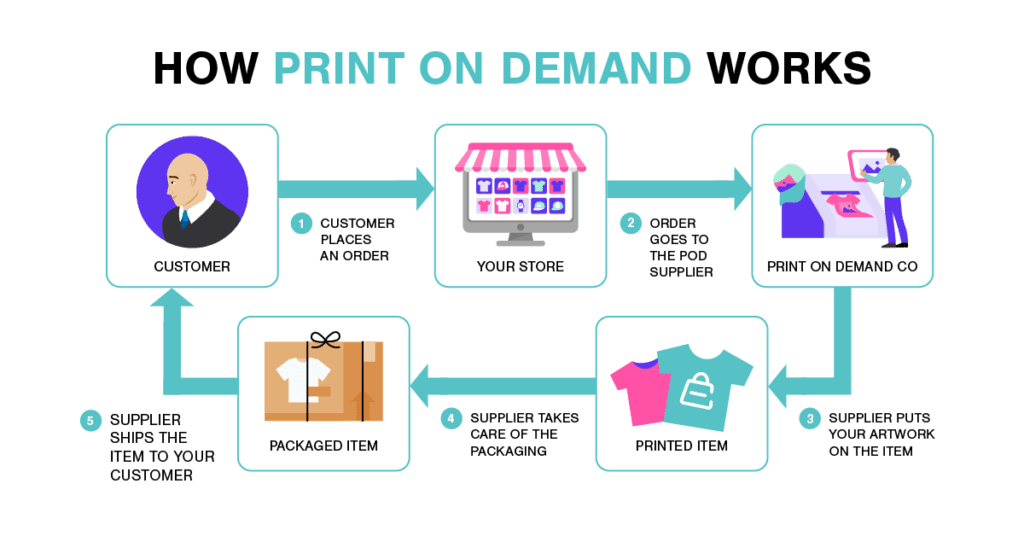
Marketing Your Art
Get your art out into the art ecosphere so it can be seen, appreciated, and sold. As one of many effective marketing strategies, use social media promotion to sell your artwork, including giveaways promoting your art for free. Besides email marketing and using blog posts, check out these digital marketing tips on how you can expand your reach and increase online sales in other ways.
Collaborating With Influencers
Engaging influencers as a form of marketing broadens your reach by sharing your art with their loyal fanbase or audience (followers). For example, art influencer James Lewis has 1.2 million followers. Imagine what one collaboration post with him could do for your art online store. Check out his Instagram for marketing inspiration.
How to get started? Know your niche. Create a mood board of relevant and related influencers that would have a customer or client base with similar interests to your genre, theme, or style of art.
You can also:
- use a search engine and keywords to find related art influencers
- search keywords and hashtags on Instagram
- use an influencer database like FeedSpot
- connect with an influencer marketing agency.
Utilizing SEO
This is all about helping people find your art through key search terms. Depending on your level of funds, capacity, and desired input:
- use free resources like Ecommerce SEO Guide: How to Boost Organic Traffic in 2023
- devise your own keyword strategy
- employ an expert.
Choosing The Right PR Strategy
No two businesses are the same. That’s why a comprehensive and well-rounded ecommerce strategy, which considers marketing, PR, and daily business practices, will be effective in helping your business:
- gain traction
- market products
- build and manage customer relationships
- gain corporate partnerships.
The opportunities for growth are only limited by your imagination.
Using Paid Ads
Nowadays, you’d be lucky if your Instagram feed and YouTube viewing isn’t littered with, or mostly, ads. Ads are usually relevant to your viewing and interest based on your clicks, likes, shares, subscriptions or follows, and user behavior.
Instagram’s parent company, Meta, has made its fortunes by collecting user data on preferences so that advertisers can more directly and specifically target platform users. So, your ad targeting options are pretty endless. You can use the same detail of ad targeting on the sister platform Facebook.
Check out our complete guide to ecommerce advertising, which includes everything from advertising with Google to Snapchat and the best advertising strategies.
Gaining Reviews
Online activity means good reviews are essential. Before trying a new restaurant, using a salon, or selecting a retailer, savvy shoppers check the reviews. What’s the quality like? Does the product deliver what it promises? How’s the customer service?
According to Globe Newswire, nine out of ten customers read product reviews before they purchase something. Reviews are vital traffic drivers to your online business. They can improve your brand trust and increase sales.
Utilizing Email Campaigns
Use email automation through an email platform, like MailChimp, Campaign Monitor, or Hubspot, to solicit reviews after a successful sale. When a customer has made a purchase, you can set up a personal email to thank them for their purchase and ask them for a review on your preferred platform. Add calls to action on any customer emails to ask for reviews.
Asking Your Customers
Whenever you receive positive feedback, either written or verbally, ask your customers if they would be happy for you to share their feedback. With permission, you can add these to your website, online store, or social media accounts as testimonials. Simply send a concise template with a link to the platform you wish them to review you on to make it as easy as pie.
Encouraging Customer Loyalty
Elevate customer exposure and loyalty by:
- creating real fans and buying customers
- creating brand evangelists
- sharing valuable content
- tapping into the power of influencer marketing
- creating meaningful, long-term relationships with customers
- managing negative sentiment.
Check out this jam-packed 50-minute episode covering all things social media and boosting brand loyalty.
Focus On Customer Service
A lot of what people remember about you or your product is the experience. Buying, sales, or the experience come back to the emotional response or our connection. There’s value in emotional connection to your brand. Connecting with your customers’ emotions can lead to a huge payoff by navigating emotional motivators that have been linked to specific profitable behaviors.
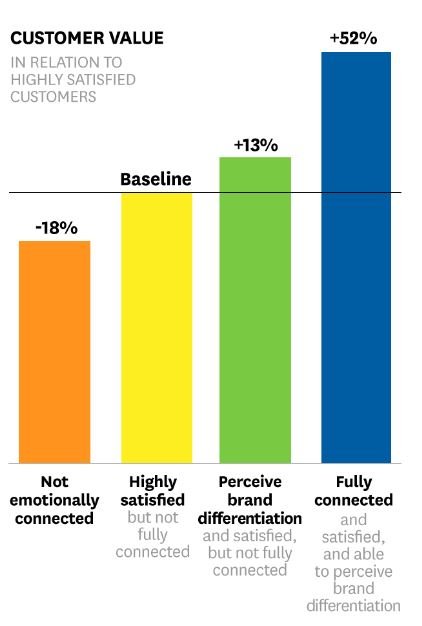
Keeping Customers Informed
Communication is key in any industry. Customers want to know what’s happening every step of the fulfillment process journey. Use shipping software to let them know:
- their order has been received
- when their order ships
- when they can expect it.
Warehouse management system software, fulfillment centers, and email automation software help you automate and organize this. Good communication is critical for epic customer service.
Selling Your Art In Person
According to Omnia Retail, globally, 47% of consumers said they were significantly more likely to purchase from brands with a local presence.
When you have the opportunity, elevate your brand by selling your art in the flesh. In-person selling lets you:
- interact with your fan base
- engage with potential customers
- build your brand and awareness
- grow your reach.
Being able to talk about your work provides a personalized touch to the products you are selling. Potential customers have the opportunity to ask you questions, find out more about you and your art, and create a meaningful connection that could lead to a long-term business relationship.
Reach out to a local gallery, a small business owner you know, or to coffee shops that display art by sending them a personal email and links to your:
- portfolio
- social media pages
- online store.
Taking Advantage Of Events
Dive in with local, community, annual, and pop-up events. Some events will be free to participate while others may have a stall and registration cost. Some will even be specialized, like an art market.
Local galleries or further afield galleries host events. Contact your hit list and see if you can get on the calendar with them. Ask your favorite shops, bars or restaurants if they would be open to showing your work on their walls.
Making A Great First Impression
Being approachable and not too overbearing allows a potential customer the right balance of space to connect with you if they have questions.
Hit it out of the park by being yourself: be authentic. Customers appreciate when you’re friendly, approachable, and helpful.
Don’t forget to let your passion for the work shine through, and always provide amazing customer service. It’s hard to make a first impression, so make it count.
Evaluating Your Success
So now you’re kicking goals and turning profits. Want to take your art selling even further? Bring marketing strategies and marketing tools into the mix to transform and validate your hard work.
Setting Budgets And Goals
Set and stick to your budget to keep your expenses down and profits up.
Antoine de Saint-Exupéry famously said, “A goal without a plan is just a wish.”
Regularly set goals and revisit your plan. Breaking goals down into achievable chunks means the milestones are less daunting.
Reducing Costs
By tracking your bottom line, you can find areas to trim costs. Warehouse management software can also help you do this through automation.
Measuring Progress
How do you know if you’re succeeding if you don’t measure? Define and set key performance indicators (KPIs) to track your progress. This could be increasing:
- brand awareness: measure traffic to your website or online store through tracking unique pageviews
- sales: measure by tracking the percentage of sales increases month to month
- customer loyalty: measure sign-ups to your loyalty program month on month.
Setting Achievable Objectives
Use data-driven SMART goals to set clear, measurable, achievable, realistic, and time-bound objectives that will help your business soar. The acronym stands for:
- Specific
- Measurable
- Achievable
- Realistic
- Time-bound
Keeping Up With Trends
An easy way to keep up with what’s new and hot in your industry is to subscribe to relevant eDMs (electronic direct mail) or newsletters from:
- brands you like
- art galleries
- art companies
- competitors
- industry bodies
- art news online magazines like Hi-Fructose and ARTnews
- design agencies
- art museums
- national art events and the organizers that put on these events.
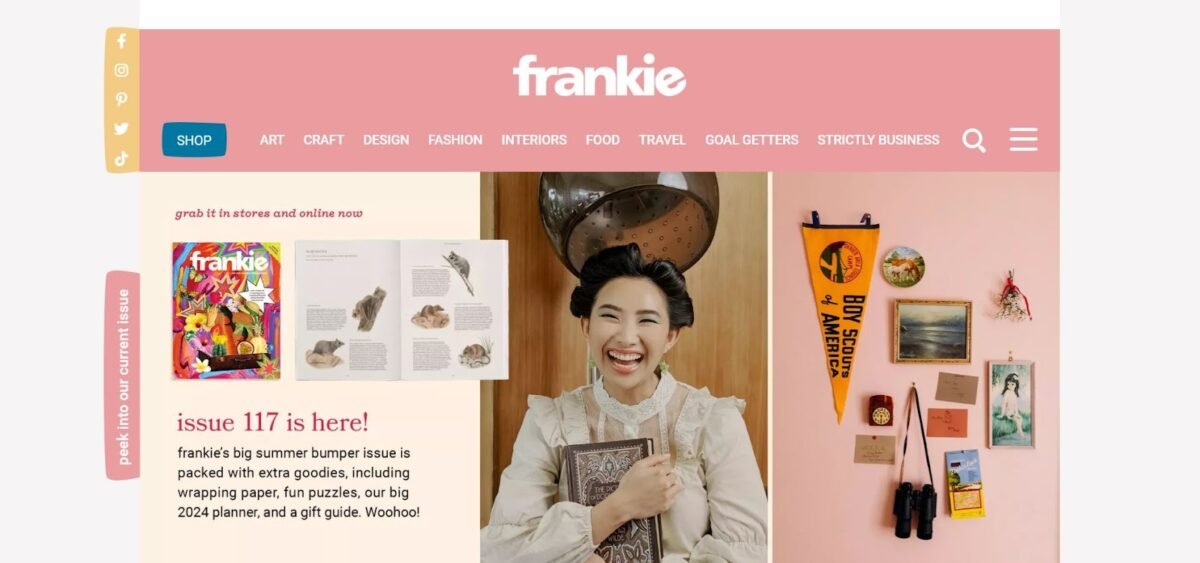
You can also follow relevant or related social media accounts.
Staying in the know will allow what you sell to remain relevant and profitable.
Gauging Customer Feedback
Is your audience digging your artwork? The success of your art biz can come down to what your larger audience has to say about you, your work, and your brand.
Use social media sentiment analysis tools to evaluate the attitudes of your target customers. The software from these tools can analyze the tone, intent, and emotion behind the text to uncover how your customers really feel about your brand. Brandwatch is one of the go-to social media monitoring and analytics tools out there.
Take it further, putting together a plan to track crowd sentiment, spotting and avoiding any potential crises, and finding ways to improve your customer service.
Tracking Industry Developments
Know where your industry is developing next and how to stay at the forefront. Capitalize on innovation by first creating and getting your work out to the public. You can sign up for updates in the industry or follow key influencers on professional networking sites like LinkedIn.
You Can Make Money Selling Artwork!
There’s no better time than now to fill the online art world with the beauty of what you can create. Equipped with the knowledge to go forth and conquer, you could be the next breakthrough online artist.










